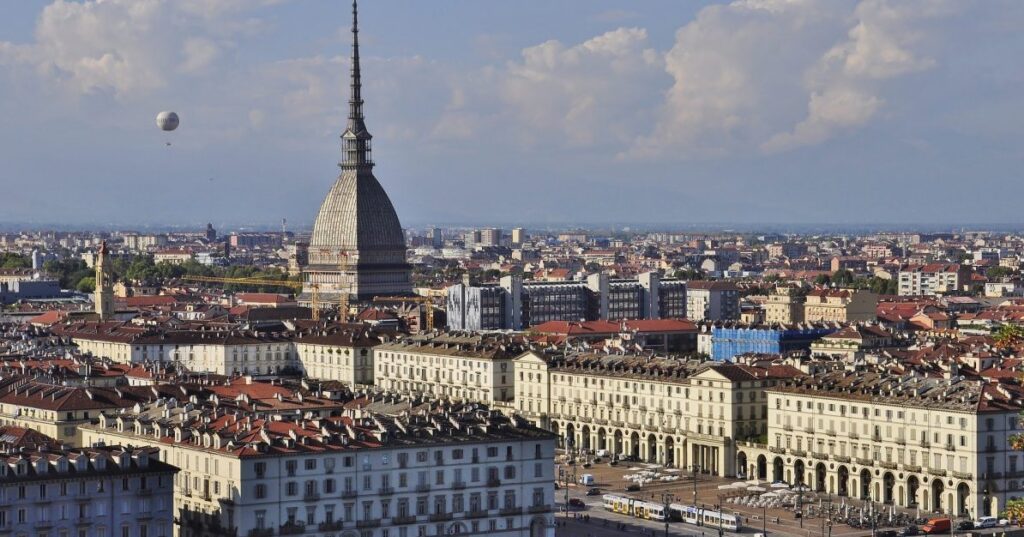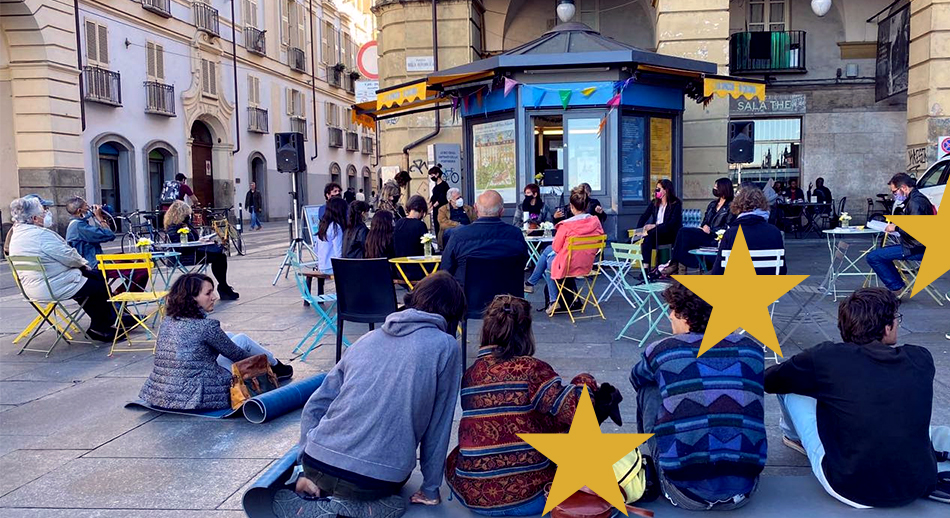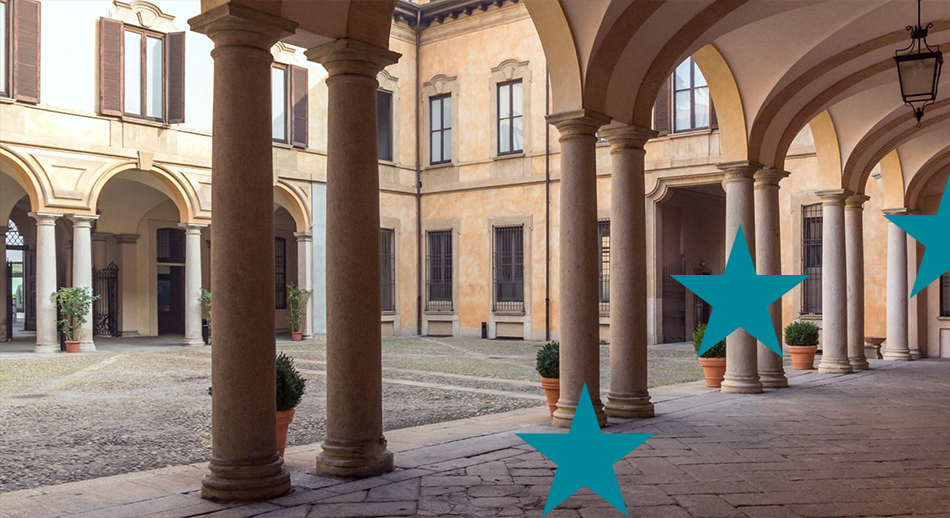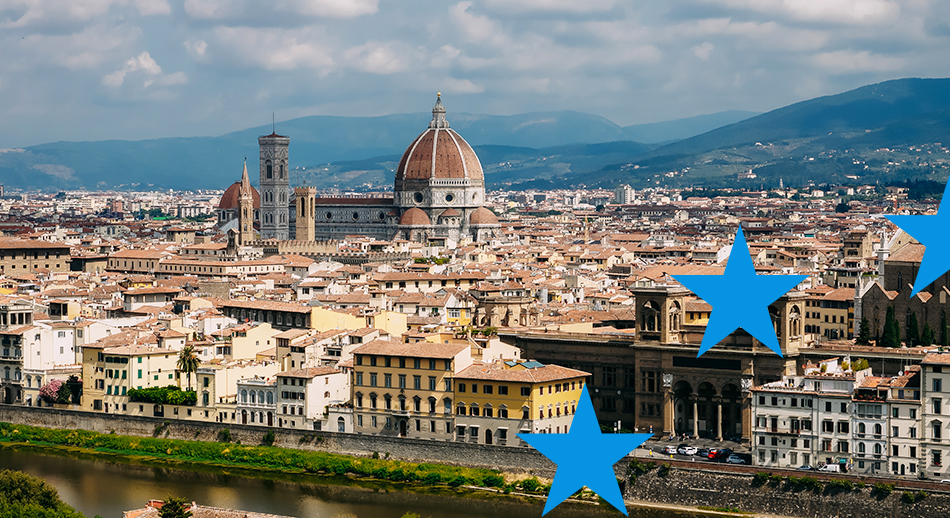In this new series of posts we will present actors promoting Europe at the local level. We will interview them and learn together about their important role in bringing local organisations, bodies and businesses closer to European funding.
Information, documentation, contacts, and insights are more at your fingertips than you might think-literally “around the corner”! A fitting contribution to the contents of our Guide, which for four years now has accompanied these actors in their efforts to bring Europe to the local organisations, and our localities to Europe.
We start in Piedmont and Turin… but we plan to expand the review to other regions and other cities!
Our very first post is dedicated to the center Europe Direct Turin .
Europe Direct information desks disseminate information about the EU at the local level, answer questions about the EU (institutions, policies, actions, and funding), and promote policy debate about Europe at the local and regional levels. At these desks, it is possible to receive information on European Union programs and initiatives, be guided in navigating related websites, consult documents, and pick up free of charge available publications and information materials.
We interviewed Alba Garavet, head of Europe Direct Turin since 2002.
What is the European Union for you? In what ways do you feel an active part of it?
For us at Europe Direct, the European Union is first and foremost the direct thread to our mission: in fact, we constitute an emanation of the European Commission, its desk in the local organisations. Europe Direct centers (more than 40 in Italy, about 450 in Europe) are coordinated by DG Communication and the European Commission Representation in the country. Each center has its own action plan and is hosted by a public organization (or one with a public purpose) that has, itself, its own specific vocation; but the work of all the centers is consistent with a common line and mission, given by the European Commission.
The purpose of each Europe Direct center is to promote the European dimension and to make Europe visible at the local level. A Europe that is made up not only of institutions, but above all of many interventions in every aspect of everyday life, of which citizens are often little aware: in the areas of theenvironment, digital, consumer protection, art, urban redevelopment, and vocational training, to name a few.
Not everyone connects Europe (for example) to the redevelopment of the Egyptian Museum in Turin, the reopening of the Reggia di Venaria, the creation of so many training courses, the infrastructural renovation of schools or the construction of bike paths.
For us, this is what Europe wants to be: something concretely close to everyone.
What is the target audience of the Europe Direct Torino center? What are your local organisations?
The Europe Direct desk has a generalist vocation: it is a point of reference for anyone, from the individual citizen to the association, from local government to business.
Europe Direct can then direct the public to more specialized services, for example, to the EEN network (Enterprise Europe Network) if dealing with issues specifically related to business life or to the EURES network (European Employment Services) if they are concerned with people interested in internships and job mobility. To get closer to a very important segment of the public, namely young people and students, Europe Direct has also opened a branch at the Turin University Campus.
Given the specific vocation of the host institution, namely the Metropolitan City of Turin, our desk is particularly active in providing support to municipalities (but also to associations and cooperatives in the local organisations) requesting information on European projects.
There is no real territorial boundary, but the center obviously has jurisdiction over the entire province of Turin and also has a regional dimension: coordinated activities are often carried out with the Europe Direct centers in Cuneo and Vercelli (the others active in Piedmont) to cover even provinces without their own center.
In what ways do you provide support? What tools and answers are you able to provide?
Europe Direct carries out very direct and concrete support: people come directly to the desk (at the Turin Metropolitan City office and at the University Campus) or contact us by e-mail or through social networks(Facebook, Twitter and Instagram).
In all cases (social included) we actively respond to our audience and invite all your readers to do so! We can help them in many ways:
- directly, with advice and guidance specific to their case;
- Providing references of the documentation needed for their needs;
- Conducting in-depth research on both legislative issues and calls for proposals;
- putting them in touch with the Europe Direct network of experts (which you can also do directly) or with other services such as EEN and EURES.
We are a “navigator’s guide,” a bit like your Guide: there is a lot of information available, but help is needed to navigate and find what is really useful for your case.
In addition to all of this, we also consider our activities aimed at creating awareness about Europe and the European Union to be an equal priority: creating active citizenship, educating about Europe, and educating about civic sense and civic culture are sides of the same coin that we deal with very directly. In order to achieve these goals, it is not enough to spread information and leaflets but it is necessary (even for us!) to develop real projects.
Europe at School and A School of OpenCoesione are two examples of projects we are very active in making young people active citizens, able to monitor the use of funds and the direct impact of projects and policies themselves. With excellent results: we discover the existence of an administration that works, funds that are used virtuously, and a European Union that acts directly in our daily reality.
What do you recommend to an organization or person wishing to participate in a European project?
We first recommend starting with a good understanding of Europe and developing a true European sensibility in the area in which you live and work. An approach that starts from just looking for funds or just wanting to apply an innovative idea is not effective. It is very important to understand Europe before embarking on this adventure.
It is also very important to be aware of one’s limitations and the difficulty of participating in certain types of European projects, in order to aim for a project form that is appropriate and within the reach of one’s organization.
For example, it is very important to be very good at implementing projects in your local organisations before launching into participation in some large , directly managed programs, such as Horizon2020: it is a bit like a soccer team, organizing to be competitive in the local league before trying to win the Champions League. On the other hand, many indirectly managed funds (financed by NOPs and ROPs) and some programs specifically designed for broad participation (such as Erasmus+) can actually be affordable for everyone, or almost everyone.
In all cases, it is important to have an idea and a sense of how one’s project can fit into the actions that the Community Institutions, Member States and Local Authorities (and non-governmental and private organizations active at various levels) are carrying out in one’s field.
Can you tell us about a particularly significant experience of your support for the Europe Direct Torino center?
There can be many examples: the projects already mentioned(Europe at School and At OpenCoesione School) are certainly experiences that we cherish and consider very successful, both for us and for our local organisations.
However, I think it is very interesting to recall a single episode that I think is very illustrative of the way we act and experience Europe and the issue of europlanning.
One day we had to address the issue of European projects in front of an audience of organizations that were involved in volunteer services. This was a very enthusiastic audience, very dedicated to the cause, very much in need of funding, made up of small organizations.
It was very difficult, in front of this audience, to expound on the concepts already stated about European projects: namely, that this is not an easy instrument, which must be approached with a broad scope and in which not all opportunities are within everyone’s reach.
However, we have also told, in great detail, what the European Union does on the issues of social inclusion and poverty reduction: really a lot of things, good and important things, not all of which are very well known.
Participants came out of the meeting in a very positive and uplifted spirit. Although they understood that they could not access European funds as easily as they had hoped, they grasped one message very well: the European Union was working in their area of interest, with great care, and with a commitment and vision quite similar to their own.
This is a seed that we believe is of great relevance for the development of local organisations and Europe. Indeed, from this awareness can come an approach to European projects that is not opportunistic and (consequently) improvised, but profound and (consequently) effective, based on understanding one’s role within Europe and (consequently) identifying the form of funding and type of proposal best suited to one’s mission.




